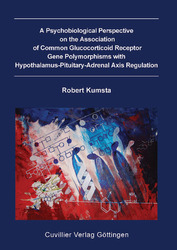| Fachbereiche | |
|---|---|
| Buchreihen (97) |
1381
|
| Nachhaltigkeit |
3
|
| Gesundheitswesen |
1
|
| Geisteswissenschaften |
2370
|
| Medienwissenschaften | 16 |
| Theologie | 57 |
| Philosophie | 102 |
| Rechtswissenschaft | 423 |
| Wirtschaftswissenschaften | 852 |
| Sozialwissenschaften | 417 |
| Sportwissenschaften | 48 |
| Psychologie | 233 |
| Pädagogik | 190 |
| Geschichtswissenschaften | 183 |
| Kunstwissenschaften | 111 |
| Kulturwissenschaften | 166 |
| Literaturwissenschaften | 117 |
| Sprachwissenschaften | 88 |
| Naturwissenschaften |
5407
|
| Ingenieurwissenschaften |
1798
|
| Allgemein |
98
|
|
Leitlinien Unfallchirurgie
5. Auflage bestellen |
|
Erweiterte Suche
A Psychobiological Perspective on the Association of Common Glucocorticoid Receptor Gene Polymorphisms with Hypothalamus-Pituitary-Adrenal Axis Regulation
Robert Kumsta (Autor)Vorschau
Inhaltsverzeichnis, Datei (30 KB)
Leseprobe, Datei (69 KB)
The stress response has evolved as a highly adaptive reaction that ensures survival when an organism is confronted with physiological or psychological challenge. However, when occurring chronically, these responses can ultimately promote or sustain disease processes. One important stress responsive system is the hypothalamus-pituitary-adrenal (HPA) axis, a hierarchical hormonal system, which mediates the endocrine stress response. The glucocorticoid receptor (GR) plays a central role in the HPA axis regulation. Experimental work presented in this thesis is intended to contribute to a further understanding of the influence of genetic factors on the functioning of the HPA axis. The relative contributions of genetic variation of the GR on HPA axis regulation under psychosocial stress, on glucocorticoid sensitivity in three target tissues and on working memory performance were investigated. The characterization of HPA axis response phenotypes in individuals carrying different GR genotypes can be a first step in the identification of individuals who are vulnerable to or protected against the development of stress related disorders.
| ISBN-13 (Printausgabe) | 3867271550 |
| ISBN-13 (Printausgabe) | 9783867271554 |
| ISBN-13 (E-Book) | 9783736921559 |
| Buchendformat | A5 |
| Sprache | Englisch |
| Seitenanzahl | 156 |
| Auflage | 1 |
| Band | 0 |
| Erscheinungsort | Göttingen |
| Promotionsort | Trier |
| Erscheinungsdatum | 17.02.2007 |
| Allgemeine Einordnung | Dissertation |
| Fachbereiche |
Psychologie
Biologie |
| Schlagwörter | Stress, Hypothalamus-Hypophysen-Nebennierenrinden Achse, Glucocorticoid Rezeptor, genetische Variabilität. |








